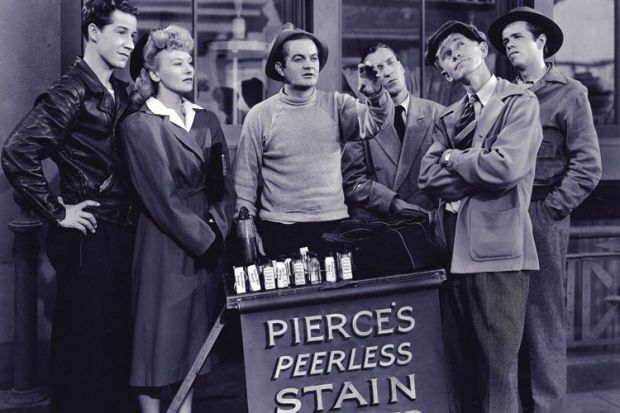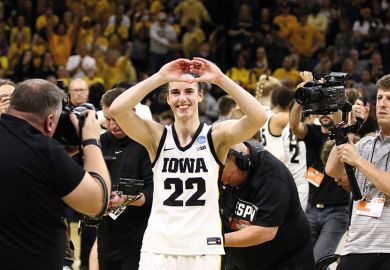Source: Kobal
Simply the best? An analysis of university prospectuses has revealed that some institutions’ claims may be spurious
Universities are misleading prospective students by deploying selective data, flattering comparisons and even outright falsehoods in their undergraduate prospectuses, research has revealed.
In one case, prospective undergraduates were told that a department’s teaching was rated as “excellent” – but not that this had been based on an assessment from 1994.
In another, an institution boasted that its department was in the top 10 nationally in the 2008 research assessment exercise – yet omitted to mention that there were only 14 such departments.
The paper, “Integrity in higher education marketing? A typology of misleading data-based claims in the university prospectus”, published in the International Journal for Educational Integrity, looked at prospectuses for 2013 entry from eight randomly selected universities.
The research found nine types of misleading claim, and the paper lists 22 examples in total.
John Bradley, the author, former principal educational psychologist and head of social inclusion for Nottinghamshire County Council, said that although he had not aimed to quantify the number of misleading claims, the 22 examples were only a proportion of those he discovered.
The research does not name the universities involved because it would be “unfair to name (and potentially shame)” them when misleading claims were “likely to be found more widely across the sector”.
But by matching phrases from the report to prospectuses online, Times Higher Education has identified three institutions involved.
One such claim identified by the paper was that an institution had “twice been named ‘Britain’s friendliest university’ in independent surveys”, which, THE has found, appears in the University of Hull’s prospectus.
But the source for this claim was an online poll by the Friends Reunited website, which had voted the institution the friendliest university only once, not twice – something Dr Bradley discovered using a Freedom of Information Act request.
Hull’s prospectus includes another claim mentioned in the paper: that it is “one of the top five Northern universities for student satisfaction”. Yet the university’s definition of “northern” excluded universities in Greater Manchester, Liverpool, Cumbria and Lancashire, another FoI request sent by Dr Bradley found.
A spokeswoman for Hull did not deny that the university had been contacted by Dr Bradley during his research, but added: “The author recognised that it was unfair to name – and potentially shame – those institutions that were randomly selected for study.”
Another institution identified by THE was Cardiff University, which claimed in its prospectus that the city was (according to the NatWest Student Living Index 2010) “one of the most cost effective cities in the UK in which to live”, but Dr Bradley found that the index actually ranks the institution 18th out of 25.
A university spokesman said that the reference was an “error in terms of its attribution” and that “processes have been reviewed and revised to avoid any recurrence”, but argued that there was other evidence, from the website moneysupermarket.com for example, that Cardiff was a cost-effective city for students.
Another statement in the paper that came in for criticism was: “Our…students report [National Student Survey] satisfaction levels of 98%”, which THE has identified as appearing in the University of Glasgow’s prospectus. “This could sound as if students, asked to score their satisfaction on the course, had given it a rating of 98/100,” the paper argues, rather than the true meaning – that 98 per cent of students were “mostly” or “definitely” satisfied with their course.
A spokesman for Glasgow acknowledged that it had been contacted by Dr Bradley as part of the research and said it now sourced all its data from the Unistats website.
The paper concludes with a number of reasons why universities should “have higher ethical standards than marketing in general”.
They offer an expensive product that cannot be tried before being bought; universities are appealing to a “potentially vulnerable group”; and their “status and reputation in society” was based on “high standards of scholarship”, it points out. It also suggests the introduction of a peer review system for marketing materials.
Paul Temple, reader in higher education management at the Institute of Education, University of London, said that Dr Bradley’s basic argument was correct. “Universities do sometimes bend the facts to breaking point, and that should stop,” he said. But he cautioned that some of the paper’s criticisms “imply that he’s setting the bar very high” in terms of how data are presented, and that some of the points it makes “verge on the pedantic”.
Register to continue
Why register?
- Registration is free and only takes a moment
- Once registered, you can read 3 articles a month
- Sign up for our newsletter
Subscribe
Or subscribe for unlimited access to:
- Unlimited access to news, views, insights & reviews
- Digital editions
- Digital access to THE’s university and college rankings analysis
Already registered or a current subscriber? Login





